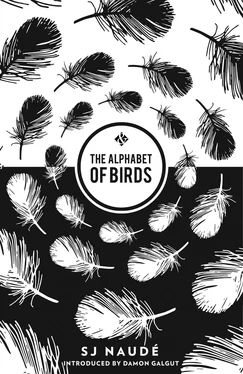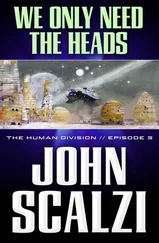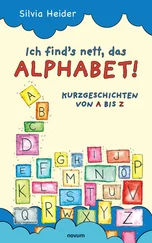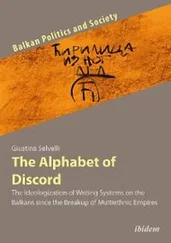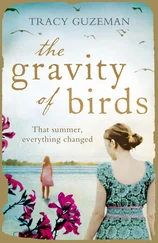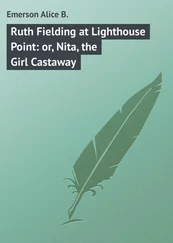‘There is something,’ says Joschka, ‘I have to tell you. About the blood, the other night.’
He can feel the cool air against his temple. He waits for the rest.
‘You should get tested.’
For a few moments he is silent.
‘Are you saying what I think you’re saying?’
Joschka turns away, starts packing things into his basket, things they do not need. He looks at Joschka as he is walking away, through the fog that is rolling from the fridges. There is a tingling feeling in his upper back.
Back at home, Joschka takes the key and they ascend the stairs in die Ruine .
‘Where can I have myself tested?’ His voice is pinched.
He does not ask Joschka other questions, about his history, whether he is on medication. He is considering his own options. Too late now, anyhow, for post-exposure prophylaxis.
‘There’s a clinic in Nuremberg. It’ll be open on Monday. We’ll have to wait.’
‘Wait? Wait!’
His voice penetrates the walls. Somewhere higher up, pigeons flutter between oak beams.
Joschka looks down at the floor, speaking slowly. ‘It wasn’t easy, you know, having to tell you …’
‘Enough, please.’
Until now it has always been possible to declare any seed of doubt, any sign of indifference towards him from Joschka, void. The slightest touch between them would exorcise any uncertainty regarding their connection. The touch would make him understand Joschka’s quirks, made him endlessly patient with him: his bravado, his instinct to pull away feverishly and be deeply needy at the same time. Perhaps that is what Joschka found in him. And a hesitant promise of safekeeping. And what did he find in Joschka? Apart from the fact that Joschka came to redeem him from his worn world, there is a lot which he draws from Joschka, but he understands little of the mechanisms as yet; he will still have to work it out for himself. For the time being, he can only understand Joschka in strings of images. Joschka ignites a blowtorch in his chest, that he knows. Joschka lifts his heart, lends him a comet’s speed and brightness, makes him as weightless as a bat. With Joschka he has been simultaneously untouchable — immortal — and a target for danger. Simultaneously armour-plated and flayed.
Now he sees Joschka stripped of imagery. He avoids the smoothness of Joschka’s skin. He is filled with urgency and disquiet, worry about himself mingled with concern for Joschka and the implications of his disclosure.
He is playing with Maximilian in the courtyard garden. They are kicking a ball back and forth, sometimes too far, so that it bounces off thick walls. Joschka is sitting in a rusty garden chair, watching. Back and forth the ball goes. The child cannot get enough of the game. They do not utter a word. They throw, then they kick. An hour passes. The sun is baking down. The child does not smile, does not say a thing. The game is all seriousness. He kicks the ball too hard; it ends up in the well. They both look over the edge; it is lying at the bottom, a red dot on a heap of rubbish.
‘ Warte hier ,’ says Maximilian, asking him not to go. Running into the house, the boy looks over his shoulder to make sure he stays.
He brings two plastic swords and shields from his room. They cross swords, again and again. Stand back, charge. Joschka is sitting in the sun. Blades are clashing with a clacking noise. On the other side of the house the Doberman is barking. Incessantly, hoarsely. He looks at Joschka from the corner of his eye, mouth tense, muscles increasingly tightened. The blunt swords keep on smacking, against the shields, against each other. Joschka jumps like a wound coil from his chair.
‘I’m going for a walk,’ he says. ‘Come with me.’
‘I’m playing.’
Maximilian looks, sword by his side. Joschka exits the gate, the heavy door swings open, he disappears alone over the moat bridge.
He holds his sword aloft. Maximilian too. They start again.
Half an hour later, Joschka is back. He and the child are sweating, but they do not stop. The swords hit each other with a rhythm distinct from that of the dog’s thirsty bark. He gains ground, retreats, lets Maximilian move forward. They stop, hold the swords in the air, start again, take turns driving each other back.
Joschka has a sheaf of yellow wild flowers in his arms, carrying it like a child against his tattoos. When Joschka passes behind him, he can smell the forest outside the thick walls. The instant consolation offered by the shadow falling over him, as soothing and intimate as moss, makes him want to sob. Their shadows slip through each other and then Joschka is gone, inside the house.
‘Let’s put away the swords, Maxi.’
Joschka puts the flowers in an earthenware ewer in their room. He does not remark on it. Joschka avoids looking at him. Within a day he will have forgotten Joschka’s eyes. Already he has trouble picturing them — sometimes so black, at other times so transparent.
Maximilian had to vacate his room for him and Joschka; the boy is sleeping with his parents in the only other bedroom. The room is filled with children’s things. Books with stories about knights, an encyclopedia showing different types of knight’s armour, swords and shields. A book about the forging of blades in previous times, about castles and city states of the Middle Ages. One containing children’s versions of Germanic and Nordic myths. There is a Lego set with plastic panels for building castle walls, little pointed flags for clicking onto the crenellations. A miniature trap door, operated with a crank between the index finger and thumb. A garrison of knights on horseback, arrangeable in battle formations. In a corner there is a box with lances and plastic swords in sheaths.
They sleep on bunk beds with children’s bedding. The duvets are virtually the only items in the room without a medieval theme. His has a pattern of aeroplanes on it, Joschka’s has red racing cars. He gets the top bunk, Joschka the bottom one. Before switching off the light, they lie in silence for a long time. They cannot see each other. His feet are sticking out from under the duvet, over the end of the bed. Joschka’s are probably hanging out even further.
They sleep restlessly amongst the toys, with cars and planes beneath their chins. When he gets up to go to the bathroom, he bends over to look out the small window. The dog is still barking ceaselessly. Above the back door there is an outdoor light. On the bright cement, the animal is contracting into spasms when the noise tears from him, as if he is vomiting. Is it not bothering anyone else? He looks in Joschka’s direction, but he is invisible in the dark. Is he sleeping or are his eyes open? Is Joschka looking at him as he is looking back at the dog? The ribs suck in, the desiccated body convulses. The eyes are glassy, the mouth foaming. When the dog notices him, he stops for a moment, looks down the quiet valley and then starts again. Like a tubercular cough. He looks at the outlines of the hills surrounding the valley. The barking is projected onto the entire landscape. Everything looks like the sound from the dog’s dry lungs.
When he returns to bed, he sees that Joschka is lying with his knees pulled close to his chest, curled up tightly against the barking. He thinks about how everything will end after this weekend. He thinks of Joschka’s shadow, soft and cool and intimate. Of how that is all that will remain.
Sunday. He does not eat breakfast, Joschka neither. Joschka’s sister and brother-in-law left early with Maximilian for the morning mass in the white baroque church whose spire rises above the pine trees at the other end of the valley. The fridge is droning and the wall clock ticking.
‘Shall we get out of here for a while?’ Joschka asks.
Читать дальше
